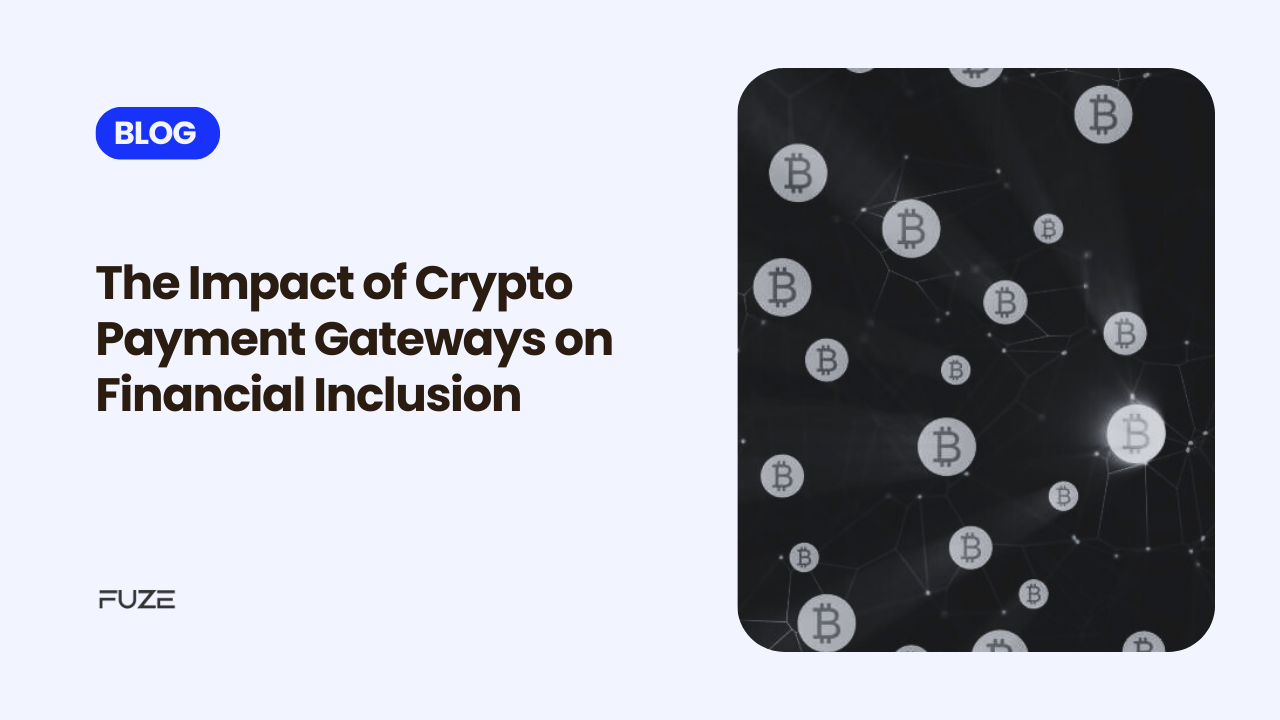In an increasingly interconnected world, financial inclusion remains a critical priority. While tremendous progress has been made in mainstream banking systems, more than 1.4 billion adults worldwide are not banked according to the World Bank. Access to essential financial services continues to be prohibited for many due to limited banking infrastructure, high transaction costs, and inadequate identification. Crypto payment gateways are emerging as a transformative solution bridging financial gaps, and facilitating more accessible and efficient digital financial tools to empower underserved communities.
This blog explores how crypto payment gateways are advancing financial inclusion, their benefits, challenges, and their transformative potential for a more equitable global economy.
Understanding Financial Inclusion
Financial inclusion refers to providing individuals and businesses with equal access to affordable and sustainable financial services such as payments, credit, savings, and insurance. It’s a cornerstone of economic empowerment, enabling individuals to build assets, reduce vulnerabilities, and invest in opportunities. Yet, structural and systemic barriers—ranging from geographical isolation to outdated regulatory frameworks—exclude billions from the benefits of the financial system.
Digital solutions, particularly those leveraging blockchain technology, are emerging as a critical tool to bridge these gaps. The emergence of blockchain-based digital solutions is being seen as an important solution to bridge these gaps. Crypto payment gateways serve as a key player in the ecosystem, allowing seamless, secure, and cost-effective global financial transactions.
How Crypto Payment Gateways Drive Financial Inclusion
- Accessibility Without Borders
Traditional banking systems often exclude individuals due to geographical or infrastructural barriers. Crypto payment gateways eliminate the need for physical banking facilities, enabling transactions through mobile phones or internet connectivity. This is particularly impactful in remote areas where financial services are scarce.
Example: In Sub-Saharan Africa, mobile wallets integrated with crypto payment gateways have allowed small-scale merchants to accept payments globally, bypassing the constraints of local banking systems. - Cost-Effective Cross-Border Payments
High remittance fees continue to burden low-income populations. Crypto payment gateways reduce these fees, making cross-border transactions significantly more affordable. - Empowering Underserved Populations
For individuals who do not have access to traditional financial institutions, crypto payment gateways serve as an alternative source for storing, sending, and receiving value. Stablecoins can be used, for instance, so that users will not worry about the volatility of the currency. - Impact in ActionIn areas where hyperinflation often erodes the value of local currencies, stablecoins facilitate stable and reliable transactions for everyday needs.
- Facilitating Microtransactions
Microtransactions, essential for daily necessities and small-scale entrepreneurial activities, often come with high fees in traditional payment systems. Crypto payment gateways support these transactions without prohibitive costs, making them accessible even for low-income earners.
Benefits of Crypto Payment Gateways for Financial Inclusion
- Decentralization and Transparency
Blockchain’s decentralized nature eliminates intermediaries, reducing costs and increasing transaction transparency. This fosters trust in regions where traditional systems lack credibility due to corruption or inefficiencies. - Financial Independence
Crypto payment gateways empower individuals by giving them direct access to funds. This is especially impactful for marginalized groups, such as women in patriarchal societies, who may face barriers to accessing traditional financial services. - Enhanced Security
Blockchain technology ensures secure and immutable transactions, protecting users from fraud and reducing risks associated with traditional financial systems. - Support for Entrepreneurs and Small Businesses
Small businesses are often excluded from traditional banking due to high costs or complex requirements. Crypto payment gateways offer affordable, easily applied solutions to accept payments and manage finances.
Challenges in Using Crypto Payment Gateways
While crypto payment gateways hold immense promise, they also face notable challenges:
- Lack of Awareness and Education
Many underserved populations are unaware of how crypto payment gateways work. Without proper education initiatives, adoption may remain limited. - Regulatory Uncertainty
Ambiguity in regulation is one of the challenges facing the growth of crypto payment gateways in some regions. However, there are some progressive frameworks, like the EU’s Markets in Crypto-Assets (MiCA) regulation, which are able to balance innovation with consumer protection. - Access to Technology
Although crypto payment gateways reduce reliance on traditional banking, they still require access to smartphones or internet connectivity, which remain out of reach for some remote populations. - Volatility Concerns
For cryptocurrencies other than stablecoins, price volatility can be a deterrent to adoption. Stablecoins address this issue but require transparent reserve backing to build user trust.
How Fuze is Leading the Way
At Fuze, we are at the forefront of driving financial inclusion through innovative crypto payment gateway solutions. Here’s how we contribute:
- Multi-Currency Support: Enabling users to transact in various cryptocurrencies, including stablecoins, to cater to diverse needs.
- User-Friendly Integration: Businesses can easily adopt our gateway without technical expertise, ensuring accessibility for all sizes of enterprises.
- Regulatory Compliance: With global standards, our solution ensures that transactions are secure, transparent, and compliant.
- Localized Solutions: Fuze offers solutions tailored to address the regional challenges. This brings financial services to communities who have unique needs.
Conclusion
Crypto payment gateways have the potential to redefine financial systems and create a more inclusive global economy. By addressing the gaps in traditional banking and leveraging the strengths of blockchain technology, these gateways empower individuals and businesses to participate in global commerce like never before.
However, realizing this potential requires overcoming challenges, from regulatory hurdles to technological barriers. Collaboration among governments, financial institutions, and tech innovators will be essential to ensure that crypto payment gateways are widely accessible and equitable.
For businesses and policymakers, embracing crypto payment gateways is not just about innovation but also an “accelerator of economic empowerment”. By investing in this transformative technology, we can pave the way for a more inclusive and prosperous future.
At Fuze, we are committed to shaping this vision by providing secure, user-friendly, and compliant crypto payment solutions that enable businesses of all sizes to unlock new opportunities. With Fuze, you can seamlessly integrate blockchain-based payments into your operations, driving growth and inclusivity in the digital economy.
Disclaimer: Virtual assets carry significant risks, including high volatility and potential loss of your entire investment. They are not backed by governmental protections, and recourse may be limited in case of loss. Always assess your risk tolerance, fully understand the risks, and seek independent financial advice if needed before investing.
Frequently Asked Questions
1. What is the connection between crypto payment gateways and financial inclusion?
Crypto payment gateways enable access to financial services for unbanked and underbanked populations by offering secure, low-cost, and decentralized payment options. These gateways reduce reliance on traditional banking systems, making it easier for individuals and businesses to participate in the global economy.
2. How do crypto payment gateways address the challenges faced by the unbanked?
By bypassing the need for a traditional bank account, crypto gateways allow users to store, send, and receive payments using only a digital wallet and an internet connection, thereby reducing barriers to entry.
3. What role do stablecoins play in enhancing financial inclusion through crypto payment gateways?
Stablecoins minimize volatility associated with cryptocurrencies, providing a reliable medium of exchange and store of value. This stability makes them ideal for payments and remittances in regions with volatile local currencies.
4. Can crypto payment gateways reduce remittance costs?
Yes, crypto payment gateways significantly lower remittance fees compared to traditional money transfer services. Blockchain technology enables near-instant cross-border transactions with minimal costs, benefiting migrant workers and their families.
5. What are the key features of crypto payment gateways that promote inclusivity?
Features like low transaction fees, accessibility through mobile devices, multi-currency support, and enhanced security make crypto payment gateways a viable option for underserved populations.







